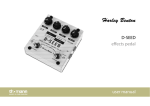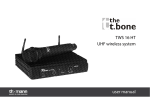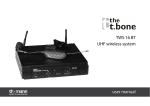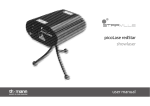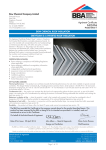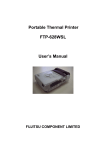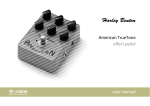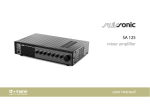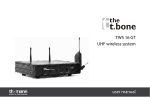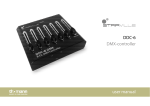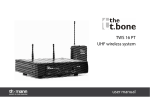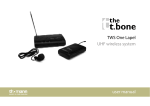Download HPA In Ear headphone amplifier user manual
Transcript
HPA In Ear headphone amplifier user manual Musikhaus Thomann Thomann GmbH Hans-Thomann-Straße 1 96138 Burgebrach Germany Telephone: +49 (0) 9546 9223-0 E-mail: [email protected] Internet: www.thomann.de 18.09.2015, ID: 245168 Table of contents Table of contents 1 General notes............................................................................................................................................... 4 2 Safety instructions..................................................................................................................................... 7 3 Installation and starting up................................................................................................................ 12 3.1 Pin assignment.................................................................................................................................. 13 4 Connections and operating elements........................................................................................... 16 5 Functions..................................................................................................................................................... 20 6 Technical specifications....................................................................................................................... 22 7 Protecting the environment.............................................................................................................. 24 HPA In Ear 3 General notes 1 General notes This user manual contains important information on safe operation of the device. Read and follow all safety notes and all instructions. Save this manual for future reference. Make sure that it is available to all persons using this device. If you sell the device to other users, be sure that they also receive this manual. Our products are subject to a process of continuous development. We therefore reserve the right to make changes without notice. headphone amplifier 4 General notes Symbols and signal words This section provides an overview of the symbols and signal words used in this user manual. Signal word Meaning DANGER! This combination of symbol and signal word indicates an immediate dangerous situation that will result in death or serious injury if it is not avoided. CAUTION! This combination of symbol and signal word indicates a pos‐ sible dangerous situation that can result in minor injury if it is not avoided. NOTICE! This combination of symbol and signal word indicates a pos‐ sible dangerous situation that can result in material and environmental damage if it is not avoided. Warning signs Type of danger Warning – high-voltage. HPA In Ear 5 General notes Warning signs Type of danger Warning – danger zone. headphone amplifier 6 Safety instructions 2 Safety instructions Intended use This device is used to amplify and mix the signals of audio equipment and musical instruments for the output to the connected headphones. Use the device only as described in this user manual. Any other use or use under other operating conditions is considered to be improper and may result in personal injury or property damage. No liability will be assumed for damages resulting from improper use. This device may be used only by persons with sufficient physical, sensorial, and intellectual abilities and having corresponding knowledge and experience. Other persons may use this device only if they are supervised or instructed by a person who is responsible for their safety. HPA In Ear 7 Safety instructions Safety DANGER! Danger for children Ensure that plastic bags, packaging, etc. are disposed of properly and are not within reach of babies and young children. Choking hazard! Ensure that children do not detach any small parts (e.g. knobs or the like) from the unit. They could swallow the pieces and choke! Never let children unattended use electrical devices. DANGER! Electric shock caused by high voltages inside Within the device there are areas where high voltages may be present. Never remove any covers. There are no user-serviceable parts inside. headphone amplifier 8 Safety instructions CAUTION! Possible hearing damage With loudspeakers or headphones connected, the device can produce volume levels that may cause temporary or permanent hearing impairment. Do not operate the device permanently at a high volume level. Decrease the volume level immediately if you experience ringing in your ears or hearing impairment. NOTICE! Risk of fire Do not cover the device nor any ventilation slots. Do not place the device near any direct heat source. Keep the device away from naked flames. HPA In Ear 9 Safety instructions NOTICE! Operating conditions This device has been designed for indoor use only. To prevent damage, never expose the device to any liquid or moisture. Avoid direct sunlight, heavy dirt, and strong vibrations. NOTICE! External power supply The device is powered by an external power supply. Before connecting the external power supply, ensure that the input voltage (AC outlet) matches the voltage rating of the device and that the AC outlet is protected by a residual cur‐ rent circuit breaker. Failure to do so could result in damage to the device and pos‐ sibly the user. Unplug the external power supply before electrical storms occur and when the device is unused for long periods of time to reduce the risk of electric shock or fire. headphone amplifier 10 Safety instructions NOTICE! Possible staining The plasticiser contained in the rubber feet of this product may possibly react with the coating of your parquet, linoleum, laminate or PVC floor and after some time cause permanent dark stains. In case of doubt, do not put the rubber feet directly on the floor, but use felt-pad floor protectors or a carpet. HPA In Ear 11 Installation and starting up 3 Installation and starting up Unpack and carefully check that there is no transportation damage before using the unit. Keep the equipment packaging. To fully protect the device against vibration, dust and moisture during transportation or storage use the original packaging or your own packaging material suitable for transport or storage, respectively. Establish all connections as long as the unit is switched off. Use the shortest possible highquality cables for all connections. Tripod mounting On the bottom, the device offers a thread which allows you to screw it to a microphone stand. Do not place the device on speaker boxes since their vibration could cause the unit to vibrate and fall off. Even though the device housing is shielded against high-frequency (RF) and electromagnetic (EMI) irradiation, do not operate the device in the area of extreme RF or EMI fields. headphone amplifier 12 Installation and starting up Operating voltage supply Use the included AC adapter to connect the device via the [DC 9V] jack to an AC outlet. For optional battery operation, open the battery compartment on the left side of the housing and insert a 9 V battery (not supplied) into the battery compartment. Close the compartment. 3.1 Pin assignment Jack plugs for signal inputs The figures and tables show the pin assignments of 1/4" phone plugs. Unbalanced mono phone plug wiring: 1 Signal 2 Ground, shielding HPA In Ear 13 Installation and starting up Unbalanced stereo phone plug wiring: 1 Signal 2, 3 Ground, shielding Balanced stereo phone plug wiring: 1 Positive signal (+) 2 Negative signal (–) 3 Ground, shielding headphone amplifier 14 Installation and starting up XLR plugs for signal inputs Phone plugs for signal output Balanced XLR plug wiring 1 Ground, shielding 2 Signal (in phase, +) 3 Signal (out of phase, –) Three-pin 3.5 mm phone plug (stereo, unbalanced) 1 Signal (left) 2 Signal (right) 3 Ground HPA In Ear 15 Connections and operating elements 4 Connections and operating elements Front panel headphone amplifier 16 Connections and operating elements 1 [BATT.CHECK] Green LED of the battery indicator. 2 [BATT.CHECK] Red LED of the battery indicator. 3 [MODE-SWITCH] Operating mode switch. 4 [BALANCE] Balance control to set the volume ratio of left and right input signal. 5 [VOLUME] Volume control to set the output level. 6 [OUTPUT] Headphones output (3.5 mm mini phone socket, stereo). HPA In Ear 17 Connections and operating elements Rear panel 7 [INPUT (R)] Balanced XLR / 1/4" TRS combo jack for connecting the right input signal. 8 [INPUT (L)] Balanced XLR / 1/4" TRS combo jack for connecting the left input signal. headphone amplifier 18 Connections and operating elements 9 Battery compartment with cover. 10 [DC 9V] Connector for the supplied power adapter. 11 [POWER ON | OFF] On / off switch. HPA In Ear 19 Functions 5 Functions Checking battery status The two [BATT.CHECK] indicators show the status of an inserted battery. With a new battery or a newly charged rechargeable battery only the green LED lights. When after a few hours of operation the battery power decreases below about 7.3 V, both indicators (green and red) light up. If only the red LED lights up, the battery voltage has dropped to about 6.5 V. Then the bat‐ tery needs to be replaced or recharged. Operating mode ‘Stereo’ When the [MODE-SWITCH] is set to ‘Stereo’ position the input signals for the left and right channels are provided accordingly at the output. With the [Balance] control you can adjust the volume ratio between left and right channel. The [Volume] control sets the overall volume. Operating mode ‘Mono-Mix’ When the [MODE-SWITCH] is set to ‘Mono-Mix’ position you can easily provide a custom mon‐ itor mix. Do this by creating, for example, a mono mix of the whole band that you feed to one of the two input channels. Feed the signal of the individual musician into the other input of the device used by him. The musician can then use the [Balance] control to individually set the volume ratio between the band mix and his own instrument signal. The [Volume] control sets the overall volume. headphone amplifier 20 Functions Optimizing the input level Adjust the level on the signal source from which the device gets the signal (e. g. the mixing console) to about 0 ~ 3 dB in signal peaks. Such an input signal ensures a sufficiently powerful output signal for the headphones connected to the unit. In addition, you prevent a sharp increase of the headphone level at high rising signal levels, that e. g. may be caused by feed‐ back. The device limits the input signal at about +5 dBm. HPA In Ear 21 Technical specifications 6 Technical specifications Audio inputs 2 × XLR / 1/4" TRS jacks (balanced) Input impedance: 15 kΩ Nom. Input level (balanced): 0 dBV Max. input level (balanced): +4 dBV Input level limit (balanced): +5 dB Headphones output 1 × 3.5 mm phone jack (stereo) Min. load impedance: 16 Ω per channel Frequency range 30 Hz … 20 kHz (± 2 dB) Output power 50 mW per channel max. (@ 20 Ω load) Operating voltage supply External: via power adapter with 9 V output, minimum 100 mA, polarity: Central connector pin = —, outer connector pin = + Internal: 9 V battery (not supplied) Current consumption: 40 mA max. headphone amplifier 22 Technical specifications Dimensions (W × H × D) 93 mm × 47 mm × 170 mm Weight 0.4 kg HPA In Ear 23 Protecting the environment 7 Protecting the environment Disposal of the packaging mate‐ rial For the transport and protective packaging, environmentally friendly materials have been chosen that can be supplied to normal recycling. Ensure that plastic bags, packaging, etc. are properly disposed of. Do not just dispose of these materials with your normal household waste, but make sure that they are collected for recycling. Please follow the notes and markings on the packaging. Disposal of your old device This product is subject to the European Waste Electrical and Electronic Equipment Directive (WEEE). Do not dispose with your normal household waste. Dispose of this device through an approved waste disposal firm or through your local waste facility. When discarding the device, comply with the rules and regulations that apply in your country. If in doubt, consult your local waste disposal facility. headphone amplifier 24 Notes HPA In Ear 25 Notes headphone amplifier 26 Musikhaus Thomann · Hans-Thomann-Straße 1 · 96138 Burgebrach · Germany · www.thomann.de































